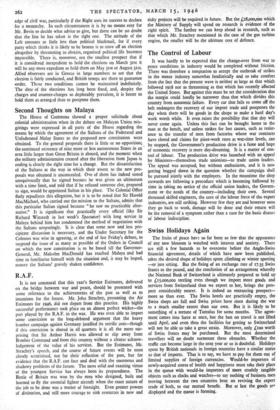Second Thoughts on Malaya
The House of Commons showed a proper solicitude about colonial administration when in the debate on Malayan Union mis- givings were expressed in all parts of the House regarding the means by which the agreement of the Sultans of the Federated and Unfederated Malay States to the proposed new constitution were obtained. To the general proposals there is little or no opposition; the continued existence of nine more or less autonomous States in an area little larger than Great Britain is absurd, and the moment when the military administration created after the liberation from Japan is ending is clearly the right time for a change. But the dissatisfaction of the Sultans at the way in which their assent to the new pro- posals was obtained is unconcealed. One of them has indeed stated unequivocally that he signed because he was given an ultimatum with a time limit, and told that if he refused someone else, prepared to sign, would be appointed Sultan in his place. The Colonial Office flatly repudiates this allegation, but it is to be noted that Sir Harold MacMichael, who carried out the mission to the Sultans, admits that this particular Sultan signed because " he saw no practicable alter- native." It is significant that practically every official (like Sir Richard Winstedt in last week's Spectator) with long service in Malaya behind him has condemned the method of negotiation with the Sultans unsparingly. It is clear that some new and less pre- cipitate discussion is necessary, and the Under Secretary for the Colonies was wise in agreeing, at the end of last Friday's debate, to suspend the issue of as many as possible of the Orders in Council on which the new constitution is to be based till the Governor- General, Mr. Malcolm MacDonald has reached Malaya and had time to familiarise himself with the situation and, it may be hoped, restore the Sultans' gravely shaken confidence.


























 Previous page
Previous page